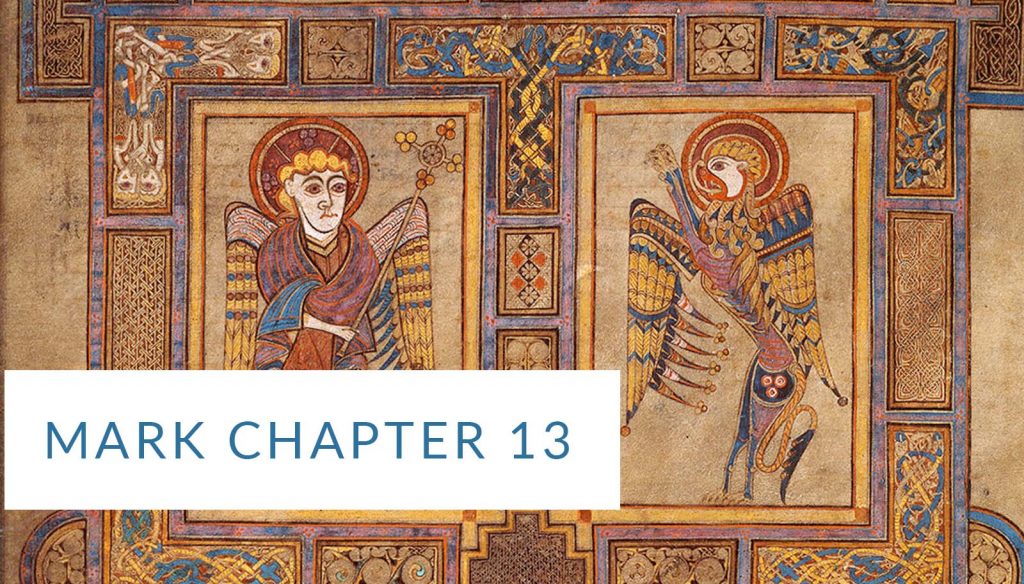This week’s readings are all from Mark chapter 14. Click here to see a full listing of each day’s reading and the full chapter of Mark 14. Full readings of each day’s smaller segments of the readings will be posted on this site during the week.
Today's Reading
While they were eating, he took bread, and after giving thanks he broke it, gave it to them, and said, “Take it. This is my body.” 23 And after taking the cup and giving thanks, he gave it to them, and they all drank from it. 24 He said to them, “This is my blood, the blood of the covenant, that is poured out for many. 25 I tell you the truth, I will no longer drink of the fruit of the vine until that day when I drink it new in the kingdom of God.” 26 After singing a hymn, they went out to the Mount of Olives.
27 Then Jesus said to them, “You will all fall away, for it is written,
‘I will strike the shepherd,
and the sheep will be scattered.’
28 But after I am raised, I will go ahead of you into Galilee.” 29 Peter said to him, “Even if they all fall away, I will not!” 30 Jesus said to him, “I tell you the truth, today—this very night—before a rooster crows twice, you will deny me three times.” 31 But Peter insisted emphatically, “Even if I must die with you, I will never deny you.” And all of them said the same thing.
32 Then they went to a place called Gethsemane, and Jesus said to his disciples, “Sit here while I pray.” 33 He took Peter, James, and John with him, and became very troubled and distressed. 34 He said to them, “My soul is deeply grieved, even to the point of death. Remain here and stay alert.” 35 Going a little farther, he threw himself to the ground and prayed that if it were possible the hour would pass from him. 36 He said, “Abba, Father, all things are possible for you. Take this cup away from me. Yet not what I will, but what you will.” 37 Then he came and found them sleeping, and said to Peter, “Simon, are you sleeping? Couldn’t you stay awake for one hour? 38 Stay awake and pray that you will not fall into temptation. The spirit is willing, but the flesh is weak.” 39 He went away again and prayed the same thing. 40 When he came again he found them sleeping; they could not keep their eyes open. And they did not know what to tell him. 41 He came a third time and said to them, “Are you still sleeping and resting? Enough of that! The hour has come. Look, the Son of Man is betrayed into the hands of sinners. 42 Get up, let us go. Look! My betrayer is approaching!”
Parallel Passages
Reading this I feel all the emotions! (I am a pretty emotional person myself). Jesus- the desperation for a different plan, the frustration of his friends falling asleep, the hurried and maybe anger he feels at the very end of this section. Peter- so sure he would NOT ever betray Jesus, he’d die for him, this fierceness he talks with and then the struggle to stay awake. (I am always the person who sits down to watch a movie with my husband and try with allllllll my might sometimes, I will fall asleep during it, even in a loud theatre!! I so
get How it can be hard to stay awake, for real)
and all the disciples saying they would not fall away, trying to be so brave and strong in this moment. I would imagine in Jesus humanness he thought “maybe they will stand for me, die with me” but he knew in his Godliness (not sure this is a word), they wouldn’t. ALL the feelings/ emotions!!
Because Communion is so much a part of our worship we don’t often give it a second thought but how new would have this idea of sharing Jesus body and blood be to the disciples? This is the new covenant and I feel like the disciples would have not grasped that idea yet which would have led to their “falling away” initially.
Gonna say, this is great discussion and I love being able to "listen" and learn from so many of you all. I'm grateful for this format and God bless you all!
